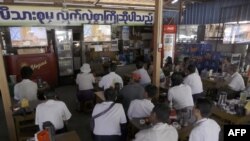Aung San Suu Kyi's ruling party will offer a glimpse of its plans for Myanmar's economy this week, in a long-awaited announcement that seeks to reassure businesses and investors who have grown increasingly worried by a lack of firm policy detail.
A burgeoning private sector had hoped the National League for Democracy's (NLD) emphatic triumph in a historic election last year would spur a quickening of reforms, but eight months on the NLD's economic strategy remains largely a mystery.
"We have not heard their broad economic policy and direction yet. Not much interaction has happened," said Win Win Tint, the CEO of City Mart Holdings Co. Ltd., which runs the country's largest supermarket chain.
She said the company's expansion plans for new supermarket, hypermarket and convenience store outlets were being scaled back for next year due in part to a lack of "encouraging economic policies."
While the government's economic plans will add some clarity, they are unlikely to go far enough to fully quell concerns over the early economic direction of the government.
The scrapping by parliament of developments approved by the last administration, and a sweeping review of construction projects that has halted work on half-built high-rises that dot the Yangon skyline, has fueled disquiet.
A senior NLD official said the government would outline parts of its economic vision for the impoverished country of 51 million later this week.
Han Tha Myint, a representative on the newly formed National Economic Coordination Committee (NECC), said policies would focus on agricultural development and the creation of jobs in the private sector.
But he admitted the policy paper would be light on detail.
"It covers many things, but is not very specific, it's quite general," he said.
A stumbling start
Myanmar's long-closed economy is now one of the world's fastest-growing, expanding at 7-8 percent a year since the military relinquished direct control in 2011, ushering in a period of wide-ranging reform under former President Thein Sein.
Although barred from the presidency by the military-drafted constitution, Suu Kyi is the ultimate decision maker in the NLD government that took power in April.
But the Nobel laureate's chief focus has been on the ethnically divided country's complex peace process, and without her driving the economic agenda critics in the commercial world say that decision-making has been sluggish.
"It seems they have not put business as a priority," said City Mart's Win Win Tint.
Responsibility for steering economic policy rests with Kyaw Win, the Minister of Finance and Planning, a career civil servant who heads what was previously two separate ministries that were merged by the NLD.
With just one deputy minister, and responsibilities that include also heading the Myanmar Investment Commission (MIC), there are concerns he is overstretched.
The reformation of MIC, a key body that approves domestic and foreign investment projects, did not take place until June, more than two months after President Htin Kyaw's inauguration.
The delay led to a backlog of $2.3 billion in foreign investment projects awaiting approval and, business officials said, was an early indicator that the NLD's focus lay elsewhere.
Kyaw Win Tun, director of the Directorate of Investment and Company Administration, said the MIC has meet twice since it was reformed last month and approved 11 foreign investments and eight local investment projects totaling around $123 million.
According to MIC figures, over the same period last year the government approved 64 foreign investment projects and 30 domestic projects, totaling around $2.8 billion in proposed investment.
This June, officials from MIC said that there was a backlog of 102 projects awaiting approval.
"The whole government machine seems to be slowing and stalling," said a Yangon-based business advisor.
"People are waiting for the ministers to make decisions and the ministries are overloaded because they have never done this job and they don't dare make decisions either."
High-rise halt
The government's biggest - and most visible - business-focused announcement to date has been a sweeping review of high-rise construction projects in Yangon that were approved by the previous administration.
The review, which the government said was to check compliance with safety or zoning regulations, has suspended work on 185 construction sites across the commercial capital.
The results for first 12 project reviewed by the Yangon government were announced earlier this month.
Most will need to make significant changes to their plans, a move that has angered developers. They say that if the suspended projects were scrapped it could cost more than $5 billion in losses.
"We are disappointed," said Thiha Zaw, the general manager of PSWN Development Company, who was told that his company's 31-storey luxury apartment project would need to be cut to 12 storys.
The company has already invested $9-10 million of the projected $80 million cost, according to its own estimates, and will now need to look at ways to reconfigure its plans.
The decision had started a domino effect in the industry, Thiha Zaw said, forcing construction workers to be laid off, sub-contractors to lose jobs and customers to question if purchased apartments would be completed.
"If these people cannot build, everybody connected to these projects will suffer," he said.





